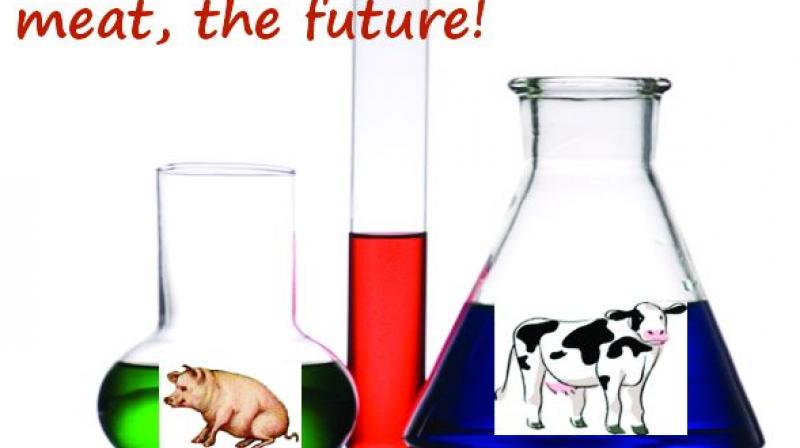Lab grown clean meat' to hit Indian markets by year-end
Current practices neglect basic animal welfare.

HYDERABAD: In a first of its kind initiative, the Centre for Cellular and Molecular Biology (CCMB), one of the country’s premier institutions for scientific research, will promote lab-grown ‘cleaned meat’ in collaboration with the Humane Society International/India.
Efforts to develop clean meat has begun due to unsustainable methods being used in large-scale industrial animal farming. The current practices neglect basic animal welfare and consequently pose a threat to environment and food security.
The technology to be used is for growing muscle from a biopsy of the animal, it may be from the breast or thigh or even from different animals i.e. chicken, duck, cow, buffalo etc.
The nutritional value of meat from a slaughtered animal Vs those made in laboratory will be microscopically the same. The shelf life of the meat made in laboratory will be the same as that of the meat that is available now because it is also meat but is grown outside the body.
In 2013, the first cultured beef i.e. clean meat was produced and cooked. At that point, the cost of one patty was $3,75,000. However, since then, in the past five years, Memphis Meat, a clean meat company founded by Indian origin cardiologist Dr Uma Valeti has produced meatballs which cost about $1,300.
While the price is still high, research is on across clean meat companies to reduce the cost further by scaling the production. One of the main reasons to collaborate with CCMB, a research institute, is to produce ancillary substances, required by the medium on which the meat is to be grown, the protein scaffold which will support the structure etc. Once these solutions are found through research, it will become easier to produce these in huge volume which will automatically reduce the cost. “It is estimated that clean meat for consumption will be available by the end of this year,” officials of Human Society International told DC.
Dr Rakesh Mishra, director, CCMB said that while technology exists to multiply literally any type of cell, including mammalian cells, the scaling up of the same in an economically affordable manner as a meat substitute remains a major challenge.
“There may also be cultural and social factors that has to be addressed for this to be socially acceptable. Scaling up of cell multiplication at industrial scale is also desirable for the upcoming era of bio-actives and bio-therapeutics. Clean meat also augments nutritional value by using genome editing technology and synthetic biology approaches,” Mr Mishra said.
N.G. Jayasimha, managing director of HSI/India, said, “This is history in making. Clean meat technology is taking the world by storm with even the biggest meat producers investing in companies developing clean meat.

